

The Ethic of the Link, Hyperlinked Writing, and Mainstream Media Link Hangups. <div class="greet_block wpgb_cornered"><div class="greet_text"><div class="greet_image"><a href=" rel="nofollow"><img src=" alt="WP Greet Box icon"/></a></div>Hello there!
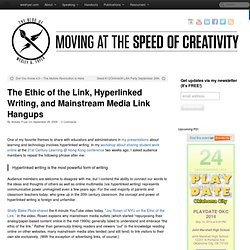
If you are new here, you might want to <a href=" rel="nofollow"><strong>subscribe to the RSS feed</strong></a> for updates on this topic. <div style="clear:both"></div></div></div> One of my favorite themes to share with educators and administrators in my presentations about learning and technology involves hyperlinked writing. In my workshop about sharing student work online at the 21st Century Learning @ Hong Kong conference two weeks ago, I asked audience members to repeat the following phrase after me: Hyperlinked writing is the most powerful form of writing.
Audience members are welcome to disagree with me, but I contend the ability to connect our words to the ideas and thoughts of others as well as online multimedia (via hyperlinked writing) represents communicative power unimagined even a few years ago. Ruminations on Implications: Notes from the Thesis. Blog. What Do You Have to Lose?
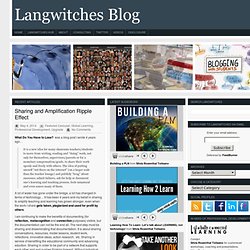
Was a blog post I wrote 4 years ago… It is a new idea for many classroom teachers/students to move from writing, reading and “doing” work, not only for themselves, supervisors/parents or for a monetary compensation/grade, to share their work openly and freely with others. The idea of putting oneself “out there on the internet” (on a larger scale than the teacher lounge) and publicly “brag” about successes, admit failures, ask for help or document one’s learning and teaching process, feels unnatural and even scares many of them.
A lot of water has gone under the bridge, a lot has changed in terms of technology… It has been 4 years and my belief in sharing to amplify teaching and learning has grown stronger, even when the work I share gets taken, plagiarized and used for profit by others. I am continuing to make the benefits of documenting (for reflection, metacognition and connection purposes) visible, but the documentation can not be the end all. 14 Steps to Meaningful Student Blogging. Distributed Writing: From Bad to Brilliant. In the report "Confronting the Challenges of Participatory Culture" the authors argue that distributed cognition is a key skill that citizens must master to be active in participatory culture.
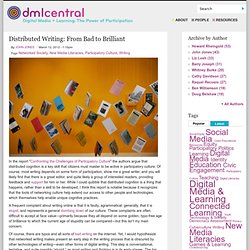
Of course, most writing depends on some form of participation; show me a great writer, and you will likely find that there is a great editor, and quite likely a group of interested readers, providing feedback and support for him or her. While I could quibble that distributed cognition is a thing that happens, rather than a skill to be developed, I think this report is notable because it recognizes that the tools of networking culture help extend our access to other people and technologies, which themselves help enable unique cognitive practices.
A frequent complaint about writing online is that it is faulty, agrammatical: generally, that it is stupid, and represents a general dumbing down of our culture. Video - How to Download Blogger and Edublogs Posts. Strategies for Blog-Powered Instruction. 21st Century Learning | Feature Strategies for Blog-Powered Instruction Three blog-savvy educators share their best practices for harnessing the unique strengths of blogs to supplement coursework and elevate student learning.
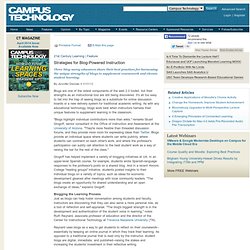
By Jennifer Demski01/01/12 Blogs are one of the oldest components of the web 2.0 toolkit, but their strengths as an instructional tool are still being discovered. It's all too easy to fall into the trap of seeing blogs as a substitute for online discussion boards or a new delivery system for traditional academic writing. "Blogs highlight individual contributions more than wikis," remarks Stuart Glogoff, senior consultant in the Office of Instruction and Assessment at the University of Arizona. The Complete Educator’s Guide to Using Google Reader. Love it!?
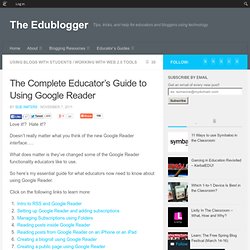
Hate it!? Doesn’t really matter what you think of the new Google Reader interface….. Getting The Most Out Of Student Blogging Assignments And Instructional Blogging. Examining Instructional Blogging Efforts and Lessons Learned.
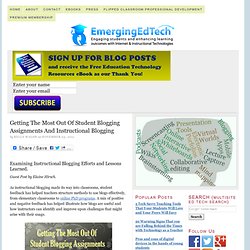
Guest Post by Elaine Hirsch. As instructional blogging made its way into classrooms, student feedback has helped teachers structure methods to use blogs effectively, from elementary classrooms to online PhD programs. A mix of positive and negative feedback has helped illustrate how blogs are useful and how instructors can identify and improve upon challenges that might arise with their usage. In his article, “Instructional Blogging: Promoting Interactivity, Student-Centered Learning, and Peer Input,” Stuart Glogoff relays student feedback after the use of instructional blogs in one of his classes.
One student reported that reading about new subjects via the blogging format was enjoyable; she found that researching the topics to post on the class blog was helpful to her overall learning experience. What You Wanted To KNOW About Student Blogging. Richard Byrne and I co-hosted an ISTE Unplugged session on blogging at ISTE 2010 in Denver.
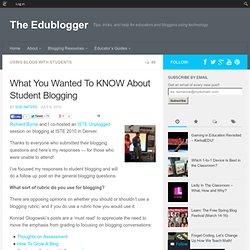
Thanks to everyone who submitted their blogging questions and here’s my responses — for those who were unable to attend! I’ve focused my responses to student blogging and will do a follow up post on the general blogging questions. What sort of rubric do you use for blogging? There are opposing opinions on whether you should or shouldn’t use a blogging rubric; and if you do use a rubric how you would use it. Konrad Glogowski’s posts are a ‘must read’ to appreciate the need to move the emphasis from grading to focusing on blogging conversations: For examples of blogging rubrics check out: How do you have students blog for homework if they do not have access to the internet or a computer (in a poor, rural area)?
Steven Anderson covered this during our session by explaining how his schools provide open lab computer access for students without access at home. To moderate or not who has the time? 1. 2.